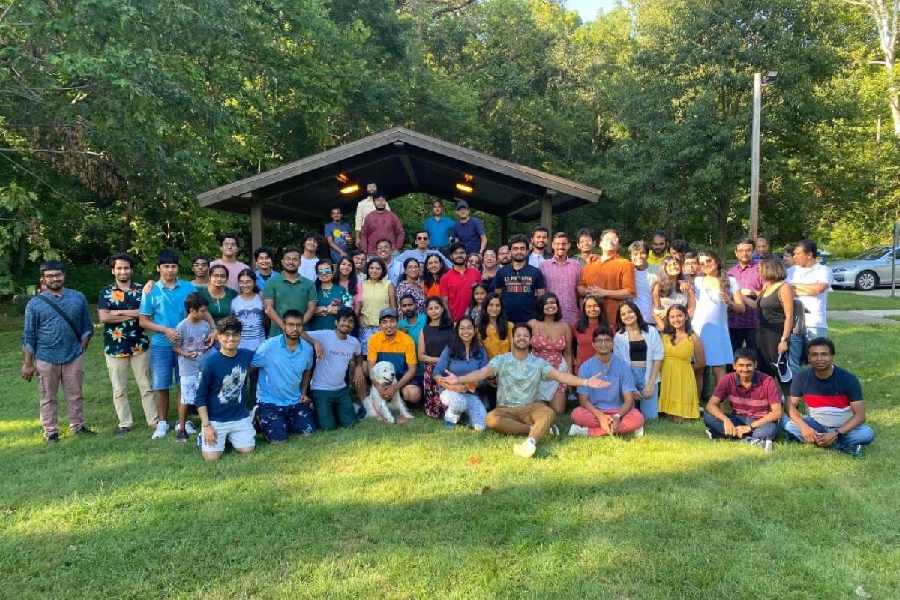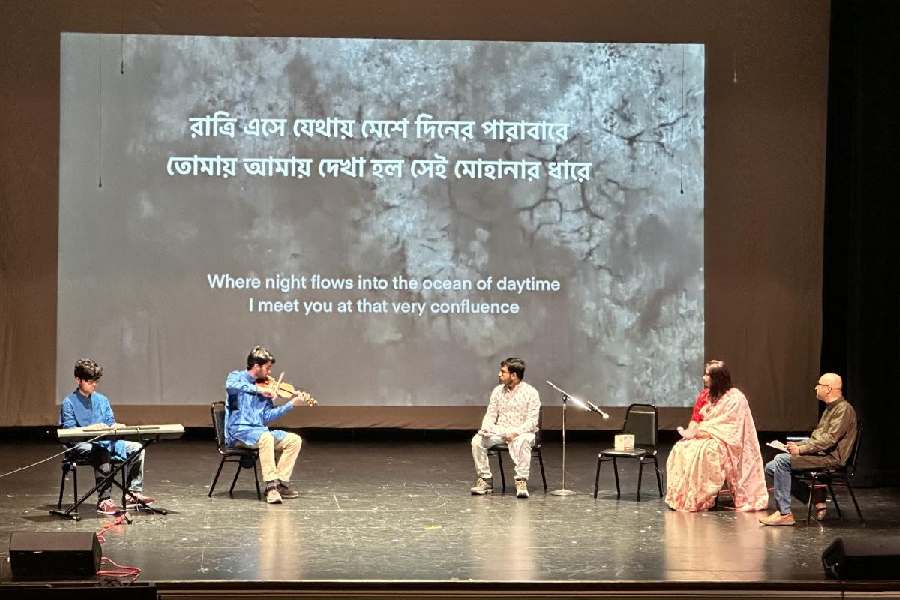Far away from home, a group of Bengali youths pursuing various academic disciplines at Urbana in the US, has created a unique hub to study and celebrate Bengali language and culture.
Sourya Sengupta, a Jadavpur University engineering graduate and Belghoria resident in Calcutta, is now pursuing a doctoral degree in electrical engineering at the University of Illinois Urbana-Champaign (UIUC) in the US.
The 29-year-old Sourya, whose parents Sumantra and Ranjana Sengupta are well-known elocutionists in Bengal, was raised in a cultural ambience that made it difficult for him to live abroad without a literary and artistic ecosystem.
Sourya, along with his friends and peers between 20 and 30 years of age, decided to bond in a far-off land over their love for literature, films, music and other genres of performing arts, all in Bengali.
Inspired by the poet-writer Sukumar Ray’s famed book of nonsense verse, they named their organisation Abol Tabol.
“Since its formation in 2022, Abol Tabol has been steadily growing and we must mention the support of the East Central Ilinois Bengal Association in our endeavour,” Sourya, a founding member of Abol Tabol, said.

Abol Tabol team during a performance at Urbana-Champaign in the US.
On the reason behind forming the organisation, Sourya said the bonds of language and culture transcended borders and fostered a sense of belongingness between students from Bengal, Bangladesh and even Bengali youths raised in the US.
Durgapur resident Bhaskar Mondal, another founding member of the group who is pursuing a PhD in aerospace engineering at the University of Illinois Urbana-Champaign, recalled how Abol Tabol was born.
“During a road trip in 2022 with my friend Sourya, we planned to start a Bengali students’ organisation. We wanted a space where people could connect, make friends and have fun. With Ayan Bhowmick, who was born and raised in the USA, but has roots in Calcutta, we launched Abol Tabol, drawing inspiration from Sukumar Ray,” Bhaskar said.
The organisation’s popularity has since grown, and today it boasts over 150 members.
The group’s activities are also tied to Urbana-Champaign’s historical connection to Rabindranath Tagore, who visited the city in 1912 after his son, Rathindranath, went to study agriculture at the varsity in 1906.
Tagore’s first public lecture after winning the Nobel Prize was held in Urbana-Champaign.
“It is an honour to be actively Bengali in a city where Tagore is remembered not just as a literary giant but as a humanitarian who bridged cultures. Through Abol Tabol, we strive to carry his legacy forward by building connections through his songs, poems and plays,” said Sourya.
Subhashis Natua, a PhD student in biochemistry and another member, with roots in Joynagar, South 24-Parganas, said: “At Abol Tabol, we celebrate the essence of Bengal — its festivals, language, and tradition. It has helped us create a vibrant community that goes beyond borders. We bring together people from Bengal, Bangladesh, the USA and beyond, making it a space where everyone feels at home in their language and culture.”
“Our mission is to build bridges across different cultures and promote bonds beyond borders. We actively collaborate with East Central Illinois Bengali Association and Bangladeshi Students’ Association here in our events,” Subhasish added.
The spirit to break barriers has attracted Americans like Kevin Hu and Christopher Gottardi, who play instruments when the group performs Rabindranath Tagore’s songs. Kevin, a postgraduate student in electrical engineering and a guitarist, was born and brought up in the US. He had no idea about Bengali language and culture till he came across his Abol Tabol friends.
Kevin said he joined Abol Tabol through a friend and performed as a guitarist. “I’ve since become a fan of Bengali rock songs and have learned so much about the culture,” he said.
Abol Tabol’s cultural events include community gatherings and festivals such as Poila Boishakh, which engage both Bengali and non-Bengali participants.
Anuprova Bhowmik, an undergraduate in computer science with Bangladeshi roots, added: “I’ve been able to connect with my heritage and share my culture with others. Abol Tabol truly feels like home.”
Beyond celebrations, the organisation engages in meaningful discussions about contemporary issues in Bengal. During the RG Kar Medical College protests, members organised a solidarity meeting on campus. During East Central Ilinois Bengal Association’s Durga Puja, they reiterated their solidarity with the RG Kar movement by installing a painting of a doctor on Goddess Durga’s lap. The painting was made by Abol Tabol member Dipannwita Dey, who recently graduated from the university.
Abol Tabol also celebrates International Mother Language Day on February 21 every year “to celebrate the beauty of all languages and give them equal respect”. This year, the members produced a video honouring 20 languages, including Bengali, Tamil, Portuguese and English.
Utsav Majumdar, the group’s cultural secretary, added: “We aim to capture the personal significance of mother tongue for our diverse community.”
“Celebrating Bhasha Dibas (February 21) is precious,” added Pooja Roy, a postgraduate student in educational psychology and a Barrackpore native.
Born and brought up in Sylhet in Bangladesh, Banhee Roy Brishti, pursuing her PhD in chemical engineering, summed it up: “My association with Abol Tabol has given me a rare opportunity to stay connected with Bengali culture and made me feel at home,” she said.










